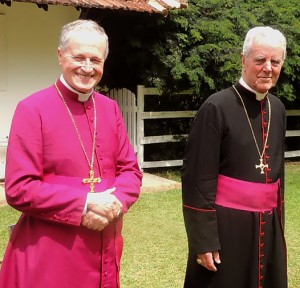 Supporters of His Excellency Bishop Williamson, whether readers of Eleison Comments, contributors to the St. Marcel Initiative, or otherwise, have no doubt already heard the news of His Excellency’s consecration of Bishop Jean-Michel Faure at the Monastery of the Holy Cross in New Fribourg, Brazil, on Thursday, the Feast of St. Joseph, March 19. The news was understandably held back until relatively the last minute so as to avoid, as far as humanly possible, any unwelcome disruptions of the ceremony or any other problems that may have arisen in conjunction with it.
Supporters of His Excellency Bishop Williamson, whether readers of Eleison Comments, contributors to the St. Marcel Initiative, or otherwise, have no doubt already heard the news of His Excellency’s consecration of Bishop Jean-Michel Faure at the Monastery of the Holy Cross in New Fribourg, Brazil, on Thursday, the Feast of St. Joseph, March 19. The news was understandably held back until relatively the last minute so as to avoid, as far as humanly possible, any unwelcome disruptions of the ceremony or any other problems that may have arisen in conjunction with it.
Nevertheless, now that the consecration has taken place, we are able to make available to the faithful and the world at large the so-called “Emergency Mandate” that was read during the liturgy.
As many already know, among the very first spoken words of the Rite of Episcopal Consecration is the statement made to the consecrating bishop by his senior assistant:
“Most Reverend Father, our holy Mother the Catholic Church asks that you promote this priest here present to the burden of the episcopate.”
In reply, the consecrating bishop asks whether the assistant has the “Apostolic Mandate.”
The answer is, “We have,” to which the consecrating bishop replies, “Let it be read.”
(Those interested further may consult online a useful Latin and English Ordo, excerpted from the Pontificale Romanum, and published in 1910.)
What was read in Thursday’s ceremony in response to Bishop Williamson’s invitation – serving as it did both a liturgical function and as a public explanation of the ceremony’s rationale as envisioned by the participants – is what follows. Readers may be interested to know that its first paragraphs closely follow the language used by Archbishop Lefebvre on June 30, 1988.
MANDATUM APOSTOLICUM
We have a Mandate to consecrate from the Roman Church which in its fidelity to Sacred Tradition received from the Apostles commands us to hand down faithfully that Sacred Tradition – namely the Deposit of the Faith – to all men by reason of their duty to save their souls.
For indeed, on the one hand, the authorities of the Church of Rome from the Second Vatican Council down to today are driven by a spirit of modernism which undermines in depth Sacred Tradition to the point of twisting its very notion: There shall be a time when they will not endure sound doctrine, turning away their hearing from the truth, turning unto fables, as St Paul says to Timothy in his second Epistle (IV, 3,5). What use would it be to ask such authorities for a Mandate to consecrate a bishop who is going to be profoundly opposed to their most grave error?
And, on the other hand, to obtain such a bishop the few Catholics who understand his importance might have hoped, even after Vatican II, that he could come from the Society of St Pius X founded by Archbishop Marcel Lefebvre, like the four consecrated for them in 1988 by a previous emergency Mandate. Alas, when the authorities of that Society showed by their constant turning towards the Roman authorities that they were taking the same modernist road, that hope proved to be vain.
From where then could these faithful Catholics obtain the bishops essential to the survival of their true faith? In a world making political war day by day more on God and on His Church, the danger for the Faith seems such that its survival can no longer be left to depend on a single fully anti-modernist bishop. The Church herself asks him to appoint an associate, who will be Father Jean-Michel Faure.
By this handing down of the episcopal power of Orders, no episcopal power of jurisdiction is assumed or granted, and as soon as God intervenes to save His Church, which has no more human hope of rescue, the effects of this consecration and of its emergency Mandate will be without delay put back in the hands of a Pope once more wholly Catholic.

 Supporters of His Excellency Bishop Williamson, whether readers of Eleison Comments, contributors to the St. Marcel Initiative, or otherwise, have no doubt already heard the news of His Excellency’s consecration of Bishop Jean-Michel Faure at the Monastery of the Holy Cross in New Fribourg, Brazil, on Thursday, the Feast of St. Joseph, March 19. The news was understandably held back until relatively the last minute so as to avoid, as far as humanly possible, any unwelcome disruptions of the ceremony or any other problems that may have arisen in conjunction with it.
Supporters of His Excellency Bishop Williamson, whether readers of Eleison Comments, contributors to the St. Marcel Initiative, or otherwise, have no doubt already heard the news of His Excellency’s consecration of Bishop Jean-Michel Faure at the Monastery of the Holy Cross in New Fribourg, Brazil, on Thursday, the Feast of St. Joseph, March 19. The news was understandably held back until relatively the last minute so as to avoid, as far as humanly possible, any unwelcome disruptions of the ceremony or any other problems that may have arisen in conjunction with it.